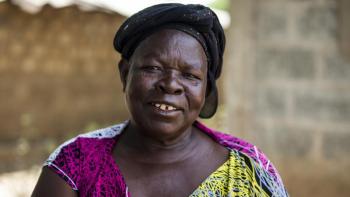Country Facts:
- Capital city: Dodoma
- Population: 61.7 million
- Life expectancy: 66.2 years
- Unemployment rate: 8.9%
- Population living below poverty line: 28.2%
Find more country facts on: CIA The World Factbook – Tanzania
Habitat Facts
- Habitat started in Tanzania in 1986
- Individuals served in FY2022: 54, 585
- Through civil society facilitation - 51,115
- Through market development - 3,470
The housing need in Tanzania
According to the 2022 population and housing census results, Tanzania’s population increased by 37% between 2012 and 2022. More than six in 10 people live in the rural areas in houses built with locally available materials such as mud and poles or sun-dried earth blocks for wall and earth, sand or dung for floor, with grass thatch roofs. The urban population is growing at a rate of 5.3% per annum, higher than the national population rate of 3.2%. Major cities such as Dar es salaam, Morogoro, Mbeya, Arusha, Tanga and Dodoma draw people in search of work. The census results also showed a total of 739,285 houses were at various stages of construction but households started living there due to a scarcity of housing.
Having to acquire land titles, building permits and mortgage finance are seen as obstacles to affordable homes for Tanzanians. Due to inadequate delivery of housing, there is extensive development of slums and informal settlements.
How Habitat addresses the need
Building affordable homes through partnerships
Habitat for Humanity Tanzania works with implementing partners MyLEGACY , Equality for Growth, Restless Development and Makazi Bora Finance to ensure families can build or improve a place they call home. Programmatic activities include improving access to water, sanitation and hygiene, or WASH, facilities, advocacy for land and property rights, financial literacy, livelihood support and climate change mitigation. Our partners also facilitate the formation of women and youth groups who champion affordable, appropriate building materials and technologies.
Advocacy
We help individuals and communities to be informed of their land and property rights, raise awareness of land reforms for women and youth, sexual and gender-based violence as well as the importance of proper sanitation and menstrual hygiene. We engage policy makers and
implementers to facilitate housing policy reforms and reviews to further individuals’ and communities’ advocacy efforts.
Youth and women empowerment
Young people aged between 15 and 35 years old make up more than one third of Tanzania’s population. Many of them migrate to urban areas in search of jobs and other opportunities. Habitat Tanzania provides group loans to youth and women for home repairs, renovation and
finishing such as roofing, flooring and painting. We also conduct training in financial literacy, entrepreneurship, and land and property rights as well as facilitate their access to loans from financial institutions for starting their own businesses.
Water, sanitation and hygiene
In 2017, more than 1,900 people were served through our partnership with WaterAid Tanzania and other stakeholders to install water infrastructure in Sangara village, Babati district.
Stakeholders provided support in housing, microfinance and technology with private sector participation in water service delivery. With better access to WASH facilities, people in the communities also improved their homes that helped generate income.
What you can do
Donate
Please visit habitat.org/donate and select “Designate your donation” to donate to Habitat Tanzania
Volunteer
The Global Village program is resuming region by region until a safe and quality experience can be provided at scale worldwide. Please visit habitat.org/gv for more information.
Tithe
Habitat affiliates in the U.S. support the international work through an annual tithe. For additional information, email [email protected] or contact your local Habitat organization.
Contact
Habitat for Humanity Tanzania
Please reach out to:
Magdalena Keffas George
National Director
Website: https://www.habitattanzania.org/
